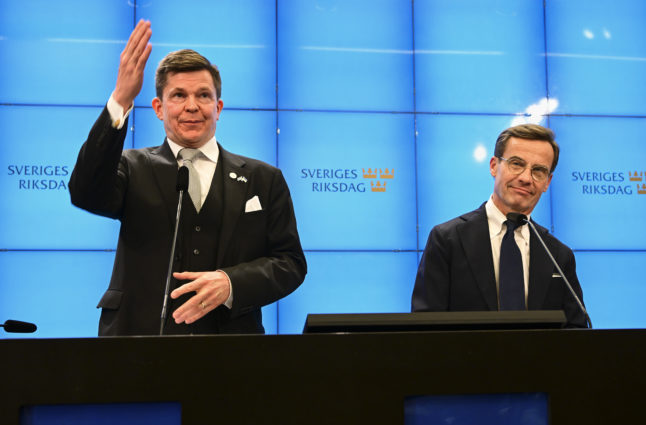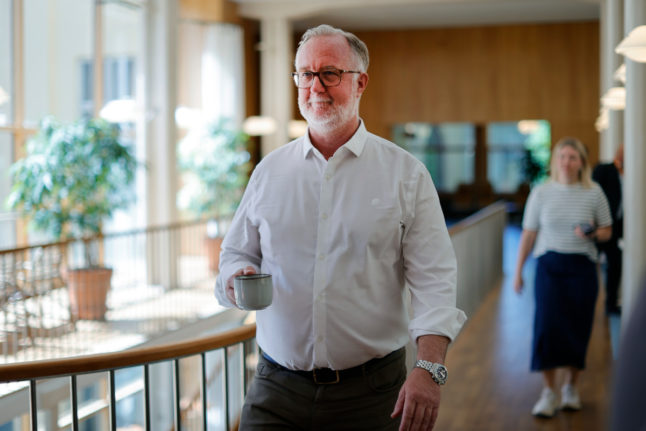Work permits
The minimum wage for work permits will be hiked, most likely to the level of a median salary in Sweden, although the final figure has not yet been confirmed. A median salary is currently 33,200 kronor, meaning the measure will quite drastically reduce the number of people coming to Sweden to work. The current minimum wage for work permit applicants is 13,000 kronor a month before tax.
The parties will also look into developing a special possibility for residency for PhDs and researchers, which will be a welcome policy for many international PhD students affected by immigration laws for PhD students and researchers introduced in July last year.
The new government will also consider making EU citizens once again need to register if in Sweden longer than three months.
Asylum
The parties intend to tighten asylum legislation to the “minimum level” allowed under European Union law or other international treaties to which Sweden is a signatory, with an inquiry into changes to asylum and immigration law launched next spring with the aim of passing a new law in parliament before the mandate period comes to an end in 2026.
Sweden Democrat leader Jimmie Åkesson said at the press conference that the agreement represented a “paradigm shift” in migration policy.
The new law and its preparations will include:
- An analysis of how asylum-processing ‘transit zones’ have been implemented in other “countries in the EU and other comparable countries”.
- An inquiry into whether asylum seekers could be held in transit centres while their asylum applications are being handled, and analyse whether such centres are possible under European Convention on Human Rights and Swedish Constitution.
- The inquiry will look into where such transit centres could be established and whose control they would need to be under, (although not mentioned in the agreement, this appears to be about the possibility for overseas processing centres such as those Denmark has been trying to establish in Rwanda or another third country).
- It will look into withdrawing residency from asylum seekers, or those with “alternative protection”, “if the original grounds for asylum no longer apply, for instance if a conflict has ended”.
- It will look into abolishing permanent residency as a concept under Swedish law, in favour of temporary residence permits (the government has since confirmed that this will only apply to asylum seekers).
- A reduction in the scope for family reunion for those with residency in Sweden to the minimum circle of relatives allowed under EU law. This includes a spouse, domestic partner, or registered partner, and any children under 18 years of age. It excludes adult children, parents, grandparents, siblings, and all other relatives.
Citizenship
Sweden Democrat proposals on extending the time it takes to qualify for citizenship have also made their way into this policy document, with the current limit of 5 years (3 years for spouses or cohabiting partners of Swedish citizens) extended to 8 years “in the normal case”.
It’s not clear what, if any, exceptions there will be for citizenship applications, or whether those married to a Swede or with Swedish children will have a reduced wait.
The parties also want to launch an inquiry into tougher requirements for knowledge of Swedish culture and society for citizenship. They did not specifically mention introducing language or culture tests, but it is likely that these would be introduced if a knowledge requirement was deemed necessary.
On top of this, they want to introduce a demand that anyone applying for Swedish citizenship can support themselves financially, although again, they did not mention how much money applicants would have to have to qualify for this requirement.
They will also investigate the possibility of introducing a new obligatory ceremony, such as an ‘oath of loyalty’ or a citizenship interview which would act as the final stage in citizenship process.
Finally, they want to look into the possibility of withdrawing citizenship from dual citizens who carry out “system-threatening crimes”, or whose citizenship was granted on false premises.
Return migration
Återvandring, or “return migration” was also included in the policy document, with the parties pledging to study any legislation developed in other countries to stimulate the return of migrants to their countries of origin.
Sweden already offers grants to refugees wanting to return to their home countries, but the parties want to look into extending this, including analysing the possibility of offering economic incentives to migrants in order to encourage them to return home, as well as how Sweden could coordinate with destination countries.
It is not clear whether these economic incentives would only be offered to refugees, or whether they would apply to all migrants in Sweden.
Finally, the parties want to establish, through a socio-economic analysis of integration, “which conditions should be a basis of receiving support for return migration”.



 Please whitelist us to continue reading.
Please whitelist us to continue reading.
Does all the policies mentioned in the 63 page proposal will be put in to inquiry stage in Spring 2023? How long the inquiry duration would normally last and would probably come in to effect?
As someone fresh to Sweden I see nothing wrong with the citizenship requirements, coming here for 5 years and speaking zero swedish/knowing nothing of the culture or country and you can be a citizen always seemed absurd